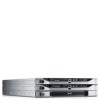Dell EqualLogic FS7500 Dell EqualLogic FS7500 - Unified block and file storage - Page 10
Storage Performance Metrics, EqualLogic FS7500 - unified storage solution price
 |
View all Dell EqualLogic FS7500 manuals
Add to My Manuals
Save this manual to your list of manuals |
Page 10 highlights
Dell EqualLogic FS7500 - Unified block and file storage for virtual workloads Finally, through the use of VMware's Storage vMotion, the FS7500 enables administrators to leverage multiple storage tiers for each virtual machine depending upon the application needs. While some storage may remain on block-based iSCSI volumes, other workloads with more unpredictable storage needs may be migrated to the NFS volumes where they can be easily expanded. Likewise, new virtual workloads may be provisioned initially on NFS volumes, and then later migrated to alternative storage on block based iSCSI volumes, if required. In addition, applications with multi-tiered datasets, like OLTP and VDI applications, when implemented in virtual environments using either block or file storage pools, can also benefit from the auto-tiering capabilities of EqualLogic PS Series arrays. The unified nature of the FS7500 solution provides an opportunity to improve productivity and streamline infrastructure management. It offers high performance and scalability for both new and existing Dell EqualLogic storage arrays to manage storage traffic over iSCSI, CIFS, and NFS protocols. This enables you to configure and manage storage for both block-based and file-based applications from a single management interface. The EqualLogic Group Manager can be used for configuration of storage pools and volumes, to create or expand CIFS shares or NFS exports, and to set up authentication, quotas, snapshots, and NDMP backups. Automated features such as load balancing across disks, RAID sets, connections, cache, and controllers help to minimize the amount of administration that IT must perform for both SAN and NAS services. As with all Dell EqualLogic products, advanced features like wizard-based installation, automated setup and configuration, native support for Active Directory, LDAP and NIS, and high availability features are all included in the base price of the FS7500 system. File-based snapshots (separate from iSCSI snapshots), enable users to restore their own files without IT involvement. As with all EqualLogic products today, all future EqualLogic firmware enhancements are available at no cost to customers with valid support contracts. Virtual server environments are delivering tremendous capital and operational cost benefits, but require consolidated storage pools to take advantage of their full functionality. As more storage is required, the volumes hosted by the FS7500 may be expanded without reconfiguring the VMware hypervisor; thus simplifying the management of a large virtualization environment. With the Dell EqualLogic FS7500, your virtualized infrastructure gains the flexibility of a unified SAN and NAS storage system, centralized management, and near linear scaling of performance and capacity. Storage Performance Metrics There are two primary metrics of storage performance: 1. Throughput: This is the quantity of data passed from the host to the target. It is expressed in two ways depending on the size of the I/O payload being measured. a. For small data payloads, throughput is often expressed in I/O operations per second (IOPS) because each storage request may contain all its data in a single storage packet, and we are interested in how quickly each transaction can be processed. b. For larger data payloads, throughput is often expressed in megabytes per second (MBPS) because a given payload may be broken into smaller fragments, making IOPS information not very useful. The goal is to determine how much data can be moved in a given time period. 2. I/O Latency: This is the round-trip delay between the source and target expressed in milliseconds. This number represents how long a given storage request takes to go from the host to the target storage device and back again (the round trip). Storage devices with high I/O latency are not suitable for response time sensitive applications like email and e-commerce. Page 8















